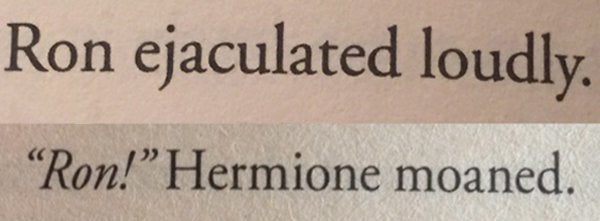I’m currently reading a novel called The Unexplainable Fairy Godmother by Sarah Noffke and Michael Anderle. It’s cute, and breezy, and relatively quickly-paced, although, like most novels where someone goes into a secondary world, there’s a huge slowdown when Paris (the main character) gets to the fairy godmother college.
That’s not what I’m here to talk about, though.
As I read several chapters of the book last night (they’re very short), I noticed that the word “stated” was used as a dialogue tag at least once every 3-5 pages (where a “page” is my phone screen, not an actual page of a printed book). That’s… a lot.
I can’t remember which professional writer (it’s a big name, though; I just can’t remember which) originally said that “said” is really all you need for dialogue tags. Author Kaye Dacus refers to William G. Tapply’s comment that “said” is all you need, and she lists a bunch of bombastically-purple dialogue tags that people tend to overuse. The most egregious one I remember is from the fifth Harry Potter book (which I will not link to), in which Ron ejaculated during a conversation.
Yes. An author of YA fiction — fiction generally aimed at teenagers — used the word “ejaculated” as a dialogue tag. Make of that what you will.

These, by the way, are called “said bookisms“.
Storm Writing School indicates that “said” is basically invisible. Which it more-or-less is. You only notice it if the writer overuses it. But to avoid that, instead of just doing dialogue tagging, writers can have characters engaging in actions or thoughts around the dialogue to indicate who is doing the speaking.
“Stated”, though, is a particularly-annoying one that a lot of amateur (and fanfic) writers overuse. One of the definitions of “stated” is “set down explicitly”, or “declared”. I can state with certainty that you could count the number of times I’ve used the word “stated” as a dialogue tag in fiction with one hand tied behind your back. It just feels weird, I suppose. Overly formal. And because it’s overused in general, especially in Kindle Unlimited fiction, I tend to notice it and it annoys me, taking me out of the story. That’s what you don’t want. When you’re writing, you want the reader to not have to think too hard about the writing itself, so they can instead think about the story you’re telling.
Maybe it’s just me. Maybe other readers don’t notice it. But I feel like overdoing the periphrastic dialogue tags distracts from the story itself, and makes me think the writer has not spent enough time honing their skill with grammar and usage. It’s similar to how Stephen King describes adverbs:
I believe the road to hell is paved with adverbs, and I will shout it from the rooftops. To put it another way, they’re like dandelions. If you have one in your lawn, it looks pretty and unique. If you fail to root it out, however, you find five the next day…fifty the day after that…and then, my brothers and sisters, your lawn is totally, completely, and profligately covered with dandelions. By then you see them for the weeds they really are, but by then it’s—GASP!!—too late.
A good adverb has its place, but using it to modify a dialogue tag is a technique that should be employed rarely. I know I do it too often, but that’s what second drafts are for — to find ways to avoid doing it. And, if you’re an author who overuses “stated” as a dialogue tag (if it appears more than once every few chapters), unless you are specifically saying the character is declaring explicitly, you should probably do something about that, too.
Wow, “ejaculated” in YA writing? Hermione “moaned”? “road to hell” adverbs? So much insight into writing that never noticed or knew ~ thanks for this.
LikeLike